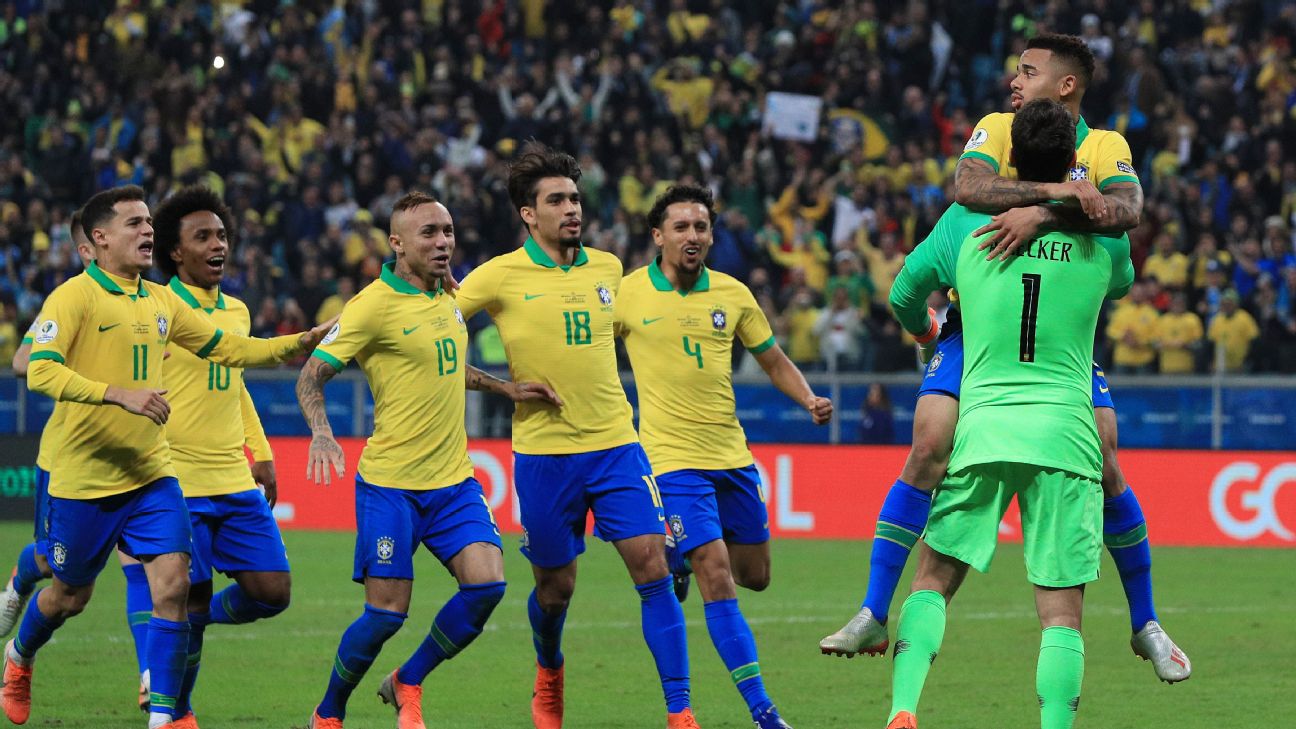
Gabriel Jesus finally put the ball in the back of the net in a major tournament. It will not count as a goal in the record books — but it ensured that Brazil beat Paraguay in the penalty shootout to make it through to the final four of the Copa America after regulation time ended in a 0-0 draw Thursday in Porto Alegre, Brazil.
Lightning came close to striking for the third time. Paraguay eliminated Brazil after a shootout in the quarterfinals of the 2011 and 2015 Copas. The second time, Derlis Gonzalez delivered the killer blow. He is one of Paraguay’s best penalty-takers. So when he stepped up to take the fifth kick with scores level Thursday, the chance of another upset seemed strong. But in the group game against Argentina he saw a penalty saved. Trying to avoid the same fate, he overcompensated and hit wide. Jesus did the rest.
Amid the relief and the euphoria of the Brazilian celebrations, one giant question cannot be avoided: How on earth were Brazil held to a goalless draw and taken to a shootout against a team who bow out of the competition without winning a single game?
– Copa America: All you need to know
– Full Copa America fixtures schedule
– Brazil fine for anti-gay chants vs. Bolivia
There are six answers to that question from this match.
One is down to the nature of football. It is a low-scoring game where defending is easier than attacking, particularly if that is a team’s overwhelming aim.
The second has to do with the dynamic of knockout football, especially in the Copa America. The group phase is a breeze. Eight of the 12 teams go through. Brazil’s place in the final eight was never in doubt. Suddenly, though, all that counts for nothing. A single mistake could result in elimination. Nerves are suddenly a factor.
Number three is pure luck. As Brazil piled on the late pressure, Willian‘s shot came back off the inside of the post. Everton and Philippe Coutinho had shots deflected just wide. On another day, they would have gone in and the game would have unfolded in a different manner, much more favourable to the hosts.
The fourth reason is the legendary resilience of the Paraguayans. They have a long tradition of heroic defence, protecting their goal with a strange kind of desperate calm. They are feared opponents for this very reason, and rose to the occasion as their history demands.
Five is the dreadful condition of the Porto Alegre pitch. There was plenty of sniffing in Brazil when Lionel Messi complained about the surface after Argentina’s game against Qatar last Sunday. He missed a chance when the ball took a bobble just before it reached him. In this game, though, it was Brazil’s turn to suffer from a surface well below the quality expected for a showpiece match. A bad pitch is far worse for the attacking team than the defending side — and it was especially damaging for a team of Brazil’s characteristics.
Which brings us to point six: grave defect of the work of Brazil coach Tite since last year’s World Cup. Tite has dwelt long and hard on last year’s 2-1 quarterfinal defeat to Belgium — and his conclusions are reflected in the tweaks he has made to the team. Accepting that he has left the side too open, there is now a more cautious balance to the midfield, and the full-backs are less swashbuckling and defensively tighter than last year.
Also, the coach came away from Russia profoundly regretting that he had persisted so long with an out-of-form Jesus at centre-forward. Everything would have been different, he convinced himself, had Roberto Firmino been the first choice. This belief — which is untestable — appears to have festered into fact. Firmino has spent a year at centre-forward — and for all his many virtues, it has yet to work. This is not because Firmino is not good enough. It is because, so far, his virtues have not been knit into the structure of the side.
The attack lacks penalty-area presence. They are lightweight. Once they have taken the lead and space opens up, they can go to town. But against determined defences — and especially on a substandard pitch — the vital first goal is proving very difficult. Regardless of what happens in the rest of the tournament — and on home ground, Brazil are surely in pole position to win the trophy — the lack of a top-class centre-forward remains a glaring problem which needs to be fixed.
